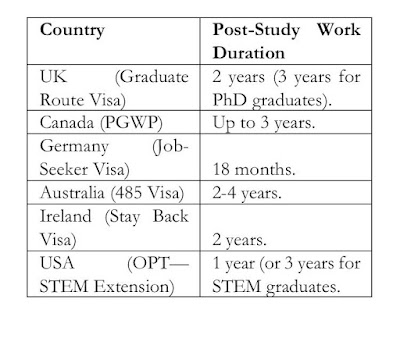By Olawale Fatunwase
Many Nigerian students who study abroad consider part-time jobs as a way to cover living expenses, gain work experience, and ease the financial burden on their families. However, balancing work and academics can be challenging, and finding a suitable job as an international student depends on factors like visa restrictions, language barriers, and job availability.
This guide explores the benefits, challenges, legal requirements, and best job opportunities for Nigerian students working abroad.
1. Can International Students Work While Studying Abroad?
The answer depends on the country and visa type. Some countries allow students to work freely, while others have strict restrictions.
Work Rights for International Students in Popular Study Destinations
📌 Tip: Always check the official immigration website of your study destination for updated work rules.
2. Benefits of Working While Studying Abroad
✔ Financial Support: Helps cover rent, food, transportation, and other expenses.
✔ Work Experience: Enhances your resume and improves employability after graduation.
✔ Networking Opportunities: Builds connections with professionals and potential employers.
✔ Improves Language & Communication Skills: Helps students adapt to new cultures.
✔ Gains Independence: Reduces reliance on family financial support.
However, students must balance work and studies to avoid academic struggles.
3. Common Challenges of Working as an International Student
📌 Tip: Avoid overworking—your studies should always come first!
4. Best Jobs for International Students
Some jobs are more flexible and student-friendly than others. Below are common jobs for Nigerian students studying abroad:
A. On-Campus Jobs (Available in Most Universities)
These jobs are easier to get since universities prioritize hiring students.
✅ Library Assistant
✅ Research/Teaching Assistant
✅ Cafeteria Worker
✅ Campus Tour Guide
✅ Administrative Assistant
✅ IT Support
📌 Tip: Apply early! Many students compete for these jobs, so checking your university’s job portal regularly increases your chances.
B. Off-Campus Part-Time Jobs (Country Dependent)
These jobs are available outside the university but require legal work permission.
✅ Retail & Customer Service (Supermarkets, Clothing Stores)
✅ Food Delivery (Uber Eats, Deliveroo)
✅ Hospitality (Hotels, Restaurants, Cafés)
✅ Warehouse or Factory Jobs
✅ Call Center Representative
📌 Tip: In some countries (e.g., the USA), off-campus jobs require special approval unless they are internships related to your studies.
C. Online & Freelance Jobs (Best for Flexibility)
These jobs allow students to work from home and earn in foreign currencies (USD, GBP, or EUR).
✅ Virtual Assistant
✅ Freelance Writing (Upwork, Fiverr)
✅ Social Media Management
✅ Online Tutoring (Teaching English or Academic Subjects)
✅ Graphic Design & Video Editing
📌 Tip: Online jobs pay well and don’t require work visas since you work remotely.
5. How to Find Part-Time Jobs as an International Student
A. Use University Career Services
Most universities have job boards, career fairs, and work-study programs for students.
B. Apply on Job Portals
🖥 Popular job sites for students include:
C. Walk-In Applications
Some businesses hire students through walk-in applications—simply visit shops, cafés, or restaurants and ask if they are hiring.
D. Network with Other Students
Join university student groups and WhatsApp communities where job openings are shared.
📌 Tip: Prepare a simple resume highlighting your skills and past experiences to improve your chances of getting hired.
6. Balancing Work and Studies: Time Management Tips
Since international students have limited work hours, it’s essential to manage time wisely.
Best Practices for Balancing Work & Academics
⏳ Prioritize Schoolwork: Never let your job affect your grades.
📅 Plan a Weekly Schedule: Assign specific hours for work, study, and rest.
🛑 Set Boundaries with Employers: Inform them that your studies come first.
🎯 Choose Flexible Jobs: Weekend shifts or remote work options are best.
💤 Get Enough Rest: Avoid burnout by taking breaks when needed.
📌 Tip: If your grades drop, reduce work hours—your degree is your priority!
7. Working After Graduation: Post-Study Work Opportunities
Many international students plan to stay and work abroad after graduation. Some countries offer post-study work visas that allow graduates to remain and work full-time.
Post-Study Work Visa Options for Nigerian Students
📌 Tip: If you plan to stay and work after graduation, choose a country with good post-study work policies.
Final Thoughts
Working while studying abroad can be rewarding but requires careful planning to avoid academic struggles. By choosing student-friendly jobs, managing time wisely, and knowing your work rights, you can earn money while still focusing on your education.
For consultation or assistance with your study abroad plans, contact me via email at wale.fatunwase@outlook.com
See you on the next episode. For now, cheers.








Comments